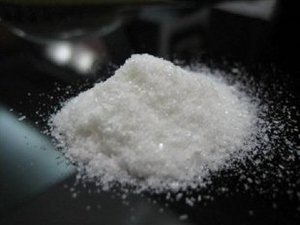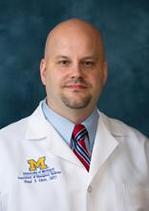No more 'Smiles' for Michigan: State health department moving to ban newest designer drug
Editor's note: This story was edited at 9:45 a.m. to reflect Michigan is working to ban an entire class of synthetic phenylethylamines that include 2C-I, a compound that previously has been banned by the federal government.
The state health department is cracking down on a new breed of amphetamine-mimicking synthetic designer drugs under an emergency scheduling process made possible by the amendment banning synthetic cannabinoids like K2 earlier this year.

The state of Michigan is working to ban a class of synthetic phenylethylamines, like 2C-I that is pictured here. The federal government has banned 2C-I.
However, recently different derivatives in the 2C class -- the most common known as 2C-I and 25i-NBOMe, among others, have been manufactured and re-engineered to avoid the chemical structures that have been deemed illegal by various government bodies.
“The legislative process is relatively slow and the way to change these chemicals is relatively fast,” said Dr. Brad Uren, assistant professor of Emergency Medicine at the University of Michigan Health System.
Common brand names include “Smiles,” which has been linked to the death of Johnny Lewis, the "Sons of Anarchy" actor who allegedly killed his landlady before falling to his death.

Dr. Brad Uren
Courtesy U-M
“There’s continually new derivatives of (phenylethylamines) as there’s this war to substitute new chemical structures to avoid scheduling,” said Dr. Kirk Brower, professor of psychiatry at the University of Michigan and executive director, of U-M's Addiction Treatment Services.
For the past five months, the Michigan State Police have been tracking the use of the synthetic phenylethylamine derivatives across the state at the request of the health department. At every one of their labs, there have been confiscated substances that have tested positive for the class of synthetic phenylethylamines, said MSP Sgt. Chris Hawkins.
“We’ve queried our labs and identified a steady proliferation of this drug throughout the state once we started tracking it five months ago,” said Hawkins, who is the policy liaison for the MSP.
The Michigan Poison Control Center has reported 19 hospitalizations of people who have used the new synthetic drugs for seizures and renal failure. To date, there have been no Michigan deaths attributed to the new designer drugs, but five people have died in the U.S. from use.
Users of the new synthetic phenylethylamines have also been reportedly physically combative with first responders, according to the state health department.
In Ann Arbor, the target group appears to be high school students, Brower said.
Between 60 to 80 percent of teens ages 14 to 18 in the Addiction Treatment Services program at U-M have either been offered a drug like "Smiles" or know how to obtain the substances, Brower said.

Dr. Kirk Brower
Courtesy U-M
Because the synthetic designer drugs are continuously altered to avoid the law, dosages are not well regulated and their effects are relatively unknown.
Each person who uses these synthetic designer drugs has a slightly different experience, Uren said, likely due to the lack of quality control of dosage and concentration.
“I would really not want anyone to be under the impression that (because) they’re not illegal yet they’re (safe),” Uren said. “It’s a bad class of drugs without a lot of benefits.”
When a patient arrives in the emergency room, doctors are only able to treat the various symptoms, which include psychosis. Additional symptoms include hallucinations, disorientation, renal failure, seizures, acute respiratory failure and central nervous system depression.
“Some of these, they don’t take effect right away, so you’re waiting and waiting and then you end up taking more than your body can really handle,” Brower said, encouraging people to go the emergency room to prevent permanent damage from an overdose.
Reports of use of new synthetic phenylethylamines have increased from 28 in 2006 to 228 in 2010, Brower said.
These new phenylethylamines are packaged similarly to the way synthetic cannabinoids and cathinones were marketed, as mimicking the effects of marijuana in psychedelic-colored wrappers and tins, Hawkins said.
However, the new products like “Smiles” aren’t typically sold at smoke shops and party stores like K2 and Spice were, Hawkins said.
Users typically buy the new phenylethylamines products online from foreign manufacturers, and either use it for their own consumption or distribute it stateside, Hawkins said.
The new phenylethylamines like 2C-I and Smiles can be a white powdery substance or be pressed into a tablet form. 2C-I has been banned by the federal government, but other derivatives in the 2C family similar to the drug are on the market.
People in possession of most new synthetic phenylethylamines cannot be charged with use of a controlled substance at this point, but the health department is working to change that.
Under a new emergency scheduling process created this summer as a part of the state’s ban on synthetic cannabinoids, the Michigan Department of Community Health will be able to more quickly enact legislation to ban the drugs. The state has decided to pursue banning the entire class of synthetic phenylethylamines to circumvent the problem of constantly changing chemical compounds.
The state health department is encouraging parents to talk to their children about the new synthetic drugs, and to call the Michigan Poison Control Center at 1-800-222-1222 with any concerns.
Amy Biolchini covers Washtenaw County, health and environmental issues for AnnArbor.com. Reach her at (734) 623-2552, amybiolchini@annarbor.com or on Twitter.


Comments
sttc
Fri, Dec 14, 2012 : 7:36 p.m.
what's your primary source on this? can you cite a pending bill? i've been looking around on the michigan legislature web site and i don't see anything pending that mentions 2C-I or 25i-NBOMe. do you have a full list of the chemicals being considered for scheduling in this legislation? thanks.
sttc
Fri, Dec 14, 2012 : 8:05 p.m.
ah, OK, thanks, i just googled it and found the MDCH press release. very vague. i guess we'll have to wait and see on the specifics. i expect most if not all the compounds that will be featured in this current round of legislation are already illegal at the federal level due to existing scheduling or analog act provisions.
Amy Biolchini
Fri, Dec 14, 2012 : 7:49 p.m.
The Michigan Department of Community Health issued a press release Monday announcing they were beginning the emergency scheduling process for a class of synthetic phenylethylamines, which means the state health department has issued an imminent danger notification regarding the drugs to the Michigan Board of Pharmacy within the Michigan Department of Licensing and Regulatory Affairs. Those two agencies are integral in making the class of synthetic phenylethylamines illegal. I do not have a full list; the names of the chemicals I wrote about is what the state health department provided to me.
BhavanaJagat
Fri, Dec 14, 2012 : 7:08 p.m.
I commend these efforts to control the sale of synthetic chemicals that people may innocently try to find some stimulant effect and derive mental excitement. It is my impression that the desire to use such chemical stimulants comes from an unknown sense of dissatisfaction in life. If there is satisfaction in life, there will not be enough reason or motivation to try chemical substances. If chemicals are found in the food that we consume, those food items also contain other nutritional substances that moderate the experience provided by the chemically active substance. Trying synthetic derivative may enhance the chemical effect but at the same time exposes the person to a higher risk like that of seizures. Thanks for sharing this story. We need this effort to prevent substance abuse.
nickcarraweigh
Fri, Dec 14, 2012 : 6:20 p.m.
Any word when people will be walking around Wal-Mart shaking highly explosive pop bottles to make their own stash? Should the burn wards be alerted? Collateral damage in the war on drugs.
rusty shackelford
Fri, Dec 14, 2012 : 4:14 p.m.
It's the sad result of our puritanism that in many cases the illegal drugs are much, much safer than legal (or only recently illegal) substitutes. Ironically, MDMA is for the most part a very safe drug, and it does indeed have potential medical benefits as well (specifically relating to alcoholism and psychological trauma). The danger of MDMA is that you don't always know what it's mixed with--but that's a result of its illegality, not the drug itself. The same is true of marijuana. I know it's counter-intuitive, and I don't encourage anyone to take drugs who doesn't want to, but if you DO want to, you're much safer using the illegal substances with long case histories and known risks than these "alphabet soup" products. Just don't risk it.
badgerboy
Fri, Dec 14, 2012 : 9:42 p.m.
Its interesting what the war on drugs has created. What will happen when these particular chemicals are outlawed? They will make new ones that are more dangerous.
rusty shackelford
Fri, Dec 14, 2012 : 5:05 p.m.
Good point. In some places you can get sold "Ecstasy" that is really like 90% speed.
Angry Moderate
Fri, Dec 14, 2012 : 4:59 p.m.
If you're going to use MDMA, be safe and use a testing kit first.
clownfish
Fri, Dec 14, 2012 : 2 p.m.
"The legislative process is relatively slow and" Maybe when it comes to safety of our food and drugs, but certainly not when it comes to divisive political power grabbing legislation. The MI GOP has shown they can move with lightening speed in the middle of the night when "important" things are afoot.
Some Guy in A2
Fri, Dec 14, 2012 : 1:51 p.m.
In addition to what Milton said, 2C-I has been around for many years now, having first become popular in the early 2000s. It was already banned federally earlier this year despite having no clear history of any serious hospitalizations or death. 25I-NBOMe is newer (no known history before 2010) and does have an association with hospitalization and death. 2C-x is a complete misnomer. It is not a drug of any kind. The 'x' is a placeholder and the label is meant to refer to the whole family of compounds that begin with the "2C" moniker. All of this information is available on wikipedia and eroid.
Amy Biolchini
Fri, Dec 14, 2012 : 2:35 p.m.
Thanks for the input. I was working off of information provided to me by the Michigan Department of Community Health, and that's how they chose to describe it to me. I've edited the story to make it a little more clear what the MDCH is working to do. By banning the entire class of phenethylamines, the state can circumvent the problem of new compounds popping up with other chemical structures that the federal government has not yet been able to ban.
Milton Shift
Fri, Dec 14, 2012 : 1:18 p.m.
Psychotic drugs? Did you mean psychedelic? "Phenethylamine" shouldn't be capitalized every time it's written, and MDMA is an amphetamine - an "alpha methyl phenethylamine," not a phenethylamine. Phenethylamines are found in chocolate, and in the body. MDMA bears little relation in its effects to these new drugs, they're more akin to LSD. They have killed far fewer people than alcohol, tobacco, caffeine, or video games. All information available on Wikipedia.
Amy Biolchini
Fri, Dec 14, 2012 : 3 p.m.
I've edited the story to read "psychoactive" instead of "psychotic." The capitalization issue was an error on my part, which I've since rectified. I understand phenethylamines are naturally occurring, but there are specific synthetic forms that are apparently being used for recreational drug use that are new and different, according to the sources I've spoken with. I'm not throwing MDMA under the bus here. The issue is the Michigan Poison Control Center had numerous reports of individuals using substances in the 2C family that they weren't familiar with, and so they asked the state health department to look into the matter. Across the country, individuals have died as a result of 2C-I and Michigan is attempting to be proactive before a death happens in the state as a result of this class of phenethylamines. Unregulated synthetic derivatives of phenethylamines are the target of this effort by the Michigan Department of Community Health. I've made some edits to the story to make it a little more clear.
Ronald K. Dankert
Fri, Dec 14, 2012 : 12:52 p.m.
Unforntunate advertising placement in this article-- "The Michigan Department of Community Health is fast tracking the ban of a class of psychotic, synthetic drugs called Phenylethylamines. Specific derivatives of Phenylethylamines have been in use since the 1960s, the most familiar being Ecstasy and MDMA. [ University Students, Faculty and Staff Receive 5% off purchases of $25 or more. ]"
GoNavy
Fri, Dec 14, 2012 : 12:01 p.m.
If we simply stopped wasting our time with prohibition, people wouldn't need to resort to bathtub gin to get their fix.
Dipstick
Fri, Dec 14, 2012 : 1:07 p.m.
+1, Pure Mdma is one of the safest drugs out there.